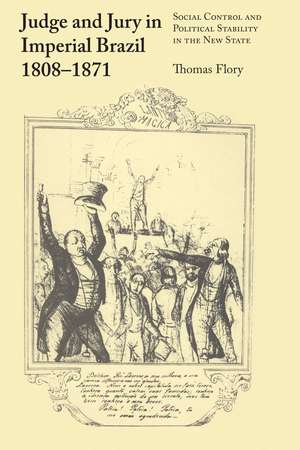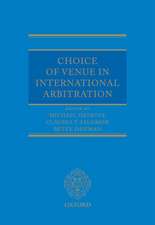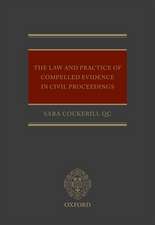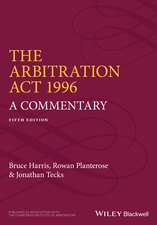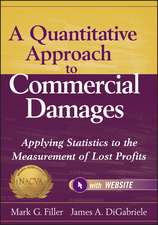Judge and Jury in Imperial Brazil, 1808–1871: Social Control and Political Stability in the New State: LLILAS Latin American Monograph Series
Autor Thomas Floryen Limba Engleză Paperback – mar 1981
Justices of the peace—lay judges elected at the parish level—played a special role in the early years of independence, for the post represented the triumph of Brazilian liberalism’s commitment to localism and decentralization. However, as Flory shows by tracing the social history and performance of parish judges, the institution actually intensified conflict within parishes to the point of destabilizing the local regime and proved to be so independent of national interests that it all but destroyed the state.
By the 1840s the powers of the office were passed to state appointees, particularly the district judges. Flory recognizes these professional magistrates as a new elite who served as brokers between the state and the poorly articulated landowner elite, and his account of their rise reveals the mechanisms of state integration.
In focusing on the judiciary, Flory has isolated a crucial aspect of Brazil’s early history, one with broad implications for the study of nineteenth-century Latin America as a whole. He combines social, intellectual, and political perspectives—as well as national-level discussion with scrutiny of parish-level implementation—and so makes sense of a complicated, little-studied period. The study clearly shows the progression of Brazilian social thought from a serene liberal faith in the people as a nation to an abiding, very modern distrust of that nation as a threat to the state.
Din seria LLILAS Latin American Monograph Series
-
 Preț: 334.78 lei
Preț: 334.78 lei -
 Preț: 123.28 lei
Preț: 123.28 lei -
 Preț: 158.95 lei
Preț: 158.95 lei -
 Preț: 197.60 lei
Preț: 197.60 lei -
 Preț: 199.89 lei
Preț: 199.89 lei -
 Preț: 263.34 lei
Preț: 263.34 lei -
 Preț: 160.09 lei
Preț: 160.09 lei -
 Preț: 198.73 lei
Preț: 198.73 lei -
 Preț: 200.06 lei
Preț: 200.06 lei -
 Preț: 240.63 lei
Preț: 240.63 lei -
 Preț: 198.52 lei
Preț: 198.52 lei -
 Preț: 199.89 lei
Preț: 199.89 lei -
 Preț: 198.90 lei
Preț: 198.90 lei -
 Preț: 198.90 lei
Preț: 198.90 lei -
 Preț: 305.21 lei
Preț: 305.21 lei -
 Preț: 200.66 lei
Preț: 200.66 lei -
 Preț: 280.43 lei
Preț: 280.43 lei -
 Preț: 200.28 lei
Preț: 200.28 lei -
 Preț: 200.42 lei
Preț: 200.42 lei -
 Preț: 198.90 lei
Preț: 198.90 lei -
 Preț: 158.36 lei
Preț: 158.36 lei -
 Preț: 200.28 lei
Preț: 200.28 lei -
 Preț: 232.88 lei
Preț: 232.88 lei -
 Preț: 225.50 lei
Preț: 225.50 lei -
 Preț: 160.48 lei
Preț: 160.48 lei -
 Preț: 158.75 lei
Preț: 158.75 lei -
 Preț: 199.51 lei
Preț: 199.51 lei -
 Preț: 240.05 lei
Preț: 240.05 lei -
 Preț: 282.17 lei
Preț: 282.17 lei -
 Preț: 280.59 lei
Preț: 280.59 lei -
 Preț: 282.17 lei
Preț: 282.17 lei -
 Preț: 200.66 lei
Preț: 200.66 lei -
 Preț: 198.90 lei
Preț: 198.90 lei -
 Preț: 239.87 lei
Preț: 239.87 lei -
 Preț: 198.90 lei
Preț: 198.90 lei -
 Preț: 232.29 lei
Preț: 232.29 lei -
 Preț: 159.51 lei
Preț: 159.51 lei -
 Preț: 231.70 lei
Preț: 231.70 lei -
 Preț: 199.89 lei
Preț: 199.89 lei -
 Preț: 241.02 lei
Preț: 241.02 lei -
 Preț: 200.26 lei
Preț: 200.26 lei -
 Preț: 263.93 lei
Preț: 263.93 lei -
 Preț: 158.20 lei
Preț: 158.20 lei -
 Preț: 223.56 lei
Preț: 223.56 lei -
 Preț: 198.89 lei
Preț: 198.89 lei -
 Preț: 160.27 lei
Preț: 160.27 lei -
 Preț: 225.50 lei
Preț: 225.50 lei -
 Preț: 241.38 lei
Preț: 241.38 lei -
 Preț: 299.28 lei
Preț: 299.28 lei
Preț: 224.14 lei
Nou
Puncte Express: 336
Preț estimativ în valută:
42.89€ • 44.90$ • 35.49£
42.89€ • 44.90$ • 35.49£
Carte tipărită la comandă
Livrare economică 05-19 aprilie
Preluare comenzi: 021 569.72.76
Specificații
ISBN-13: 9781477305928
ISBN-10: 1477305920
Pagini: 284
Dimensiuni: 152 x 229 x 15 mm
Greutate: 0.42 kg
Editura: University of Texas Press
Colecția University of Texas Press
Seria LLILAS Latin American Monograph Series
ISBN-10: 1477305920
Pagini: 284
Dimensiuni: 152 x 229 x 15 mm
Greutate: 0.42 kg
Editura: University of Texas Press
Colecția University of Texas Press
Seria LLILAS Latin American Monograph Series
Notă biografică
Thomas Flory received his PhD in history from the Univeristy of Texas at Austin. He has taught Latin American history at several universities.
Cuprins
- Preface
- Acknowledgments
- Part I. Brazilian Liberalism and Justice in the Independence Period, 1808–1831
- 1. Introduction: Liberalism in a Time of Transition
- 2. Reformist Thought and Brazilian Society
- 3. The Judicial Legacy
- Part II. Reform, 1827–1837
- 4. The Imperial Justice of the Peace
- 5. Judicial Personnel: The Justice of the Peace
- 6. The World of the Justice of the Peace
- 7. Legal Codes and the Jury System
- Part III. Reaction and the Counterreform, 1837–1871
- 8. Reactionary Thought and Brazilian Society
- 9. Justice, Police, and Patronage, 1834–1841
- 10. The Politics of Justice, 1841–1871
- Conclusion
- Notes
- Bibliography
- Index
Descriere
An analysis of the Brazilian lower-court system in the nineteenth century, where the private interests of society and the public interests of the state intersected.
